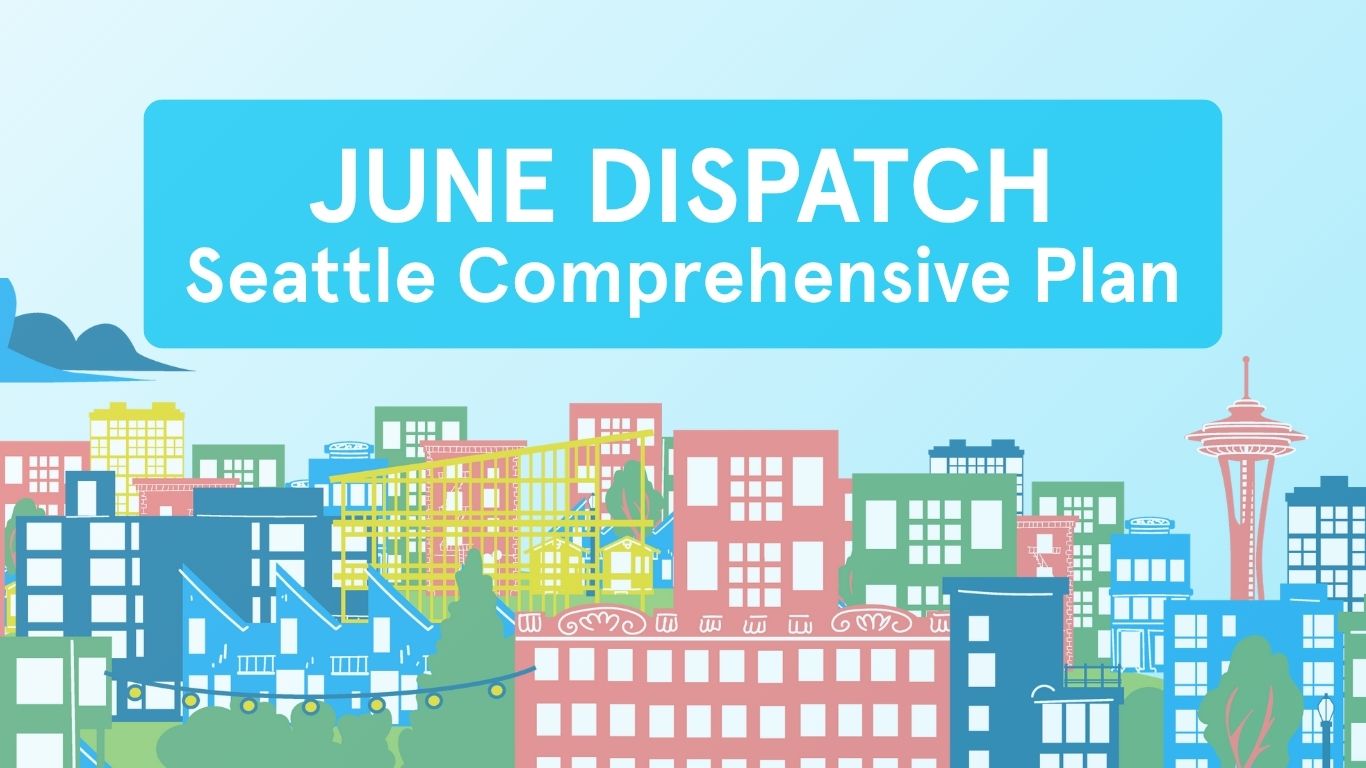Seattle’s Plan For The Next 20 Years, and What Futurewise Thinks Must Be Considered

You may have heard about Seattle and its comprehensive plan wondering what it is and what it has to do with you. Futurewise is here to give a quick background, our own comments, and what you can do. Warning: it’s wonky! We’re here to break it down for you.
The Comprehensive Plan and Environmental Impact Statement
The comprehensive plan (also known as a “comp plan” for short) is the blueprint for how cities want to grow and where they want to invest for the next 20 years. Currently, Seattle is looking to update their comp plan by 2024, with the goal to create a more equitable, livable, sustainable, and resilient city by addressing topics and challenges like: racial inequities, past and current; displacement pressures; housing cost; climate change and resilience; etc. These challenges will determine the different planning elements that are shaped by the comp plan like: land use, transportation, housing, parks and open spaces, environment, and economic development.
You might be familiar with the concept of a comp plan if you joined Futurewise in advocating for our Washington Can’t Wait legislative priorities. We passed House Bill 1220 (HB 1220) in 2021, which makes sure that as cities like Seattle work on their comp plan, they’re including a plan for housing that’s affordable to people at every income level. We also worked with you on HB 1099, an effort to require cities and counties to plan for climate change. While HB 1099 didn’t pass this year, the Seattle City Council recently adopted Resolution 32059 which directs city staff to study the impacts of Seattle’s growth on climate change.
Seattle is in the very early stages of the comp plan update process, working on what’s called an Environmental Impact Statement (EIS). The EIS, which is required by the State Environmental Protection Act (SEPA) for any policy or project that significantly affects the environment, is a study of: a) the conditions as they exist today, b) the impacts that the updated comp plan will have on the environment, and c) the ways the City can try to mitigate negative environmental impacts.
Basically, the EIS is the groundwork for the comp plan: it’s required to identify and analyze alternative approaches, also known as growth strategies, to meet the goals of the comp plan. The EIS scope is what determines exactly what kinds of changes the city will consider later in the comp plan process. If the city only analyzes the impact of making small changes in the EIS, then they will only be able to consider small changes later on when they actually change the comp plan. On the other hand, if the city analyzes the impact of big changes, or lots of kinds of changes, they will have more options to consider when updating the comp plan.
This early stage of the process is the first opportunity for public feedback on the comp plan. Right now, the City of Seattle’s Office of Planning and Community Development is taking feedback from community members regarding the scope of the EIS. So far, the EIS has 5 growth strategies referred to as the EIS alternatives that will be analyzed regarding the environmental and community impact of each. People like you can let the city know whether or not they think these current options capture the range of what the city should study, or if the city should expand its analysis.
Futurewise Comment Letter

Another way that people or organizations can give feedback to the City is by submitting something called a comment letter. As stewards of the Growth Management Act (GMA), Futurewise submitted our full comment letter to the City of Seattle. Click the link below if you want to read our full letter, or just keep reading for an overview of our comments.
Futurewise Seattle 2024 Comp Plan EIS Scoping Comment Letter
Overall, we think the City is on the right track and we support the general framework of the five alternatives being considered. However, there are some areas that need improvement regarding housing, climate, and racial equity. We believe all of these alternatives should be revised to allow for higher amounts of housing and jobs growth than the minimum required. We also think the City isn’t going big enough with its analysis, which could constrain our options down the road. That’s why we’re supporting adding a sixth alternative that would allow for higher levels of housing and job growth. (If you want to see a breakdown of each alternative, you can check out this article!)
You might be wondering, Which alternative does Futurewise prefer? The short answer is: we don’t know yet. While we have suggested improvements for each proposed alternative, we want to wait for the City to release its EIS before we decide which growth strategy would best accommodate the next 20 years of growth.
Our comment letter is a lengthy and detailed document, so we have pulled out a few of our top priorities and posted them as individual comments on the City’s Engagement Hub.
Futurewise’s Top Priority Comments:
- Increase The Growth Targets And Add A Sixth Alternative
- Use A “Gap Filling” Approach When Choosing Where To Focus Housing Growth
- Use A Racial Equity Lens When Refining Each Growth Strategy
- Add More Mixed Use To Each Strategy To Allow More Essential Daily Services
- Study Climate Impacts And Mitigation Measures
- Study The Impact Of Alternative Growth Strategies On The Mandatory Housing Affordability (MHA) Program
What you can do
As you see, the EIS and Comprehensive Plan impacts all of us as we plan ahead for Seattle, and if you read all of this, there’s bound to be at least one thing you are super concerned about. That’s where you come in. You can:
- Leave a comment on the scope of the EIS. You can either write your own comment, or use the template our friends over at Share The Cities created to leave a comment.
- Upvote our comments! If you click on any of those comments, you can upvote our specific comments so the city knows our feedback is supported!
- Upvote our friends’ comments! We have amazing comrades who are doing this work (here, here, and here), so go ahead and upvote them as well!
- Finally, you can share this blog. We do our best to make all this wonky but important information more accessible so that everyone can have a say about all things comp plan! Sharing this blog will hopefully encourage others to get involved in what is definitely a very important moment for the City of Seattle.
If you have any questions or want to get involved, you can always reach out to Tiernan who is leading our efforts. You can also subscribe to our newsletter where we keep you up-to-date on our work with the GMA locally and all across Washington. Lastly, you can follow us on Facebook or Twitter.


